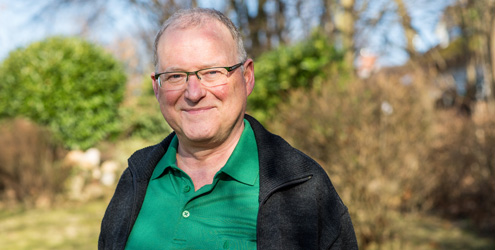"It's my new lung and I will cherish it"
Josef Moosmann loves hiking. He loves being outdoors in nature and taking deep breaths. Just a year ago, he couldn't live for four minutes without an oxygen machine. He was constantly afraid of suffocating and waited for the redemptive call from the thoracic surgery clinic with the news that a donor lung was available.

It all began almost 13 years ago with bronchitis that just wouldn't heal. Josef Moosmann found it difficult to breathe. A bronchoscopy at Freiburg University Hospital revealed the cause of his symptoms: pulmonary fibrosis.
"I remember that time well. I was admitted to hospital on the same day and the doctor told me I had a serious illness that needed to be taken seriously." The pulmonary alveoli increasingly turned into functionless, rigid connective tissue. There was no cure. Life expectancy was a few years.
Despite the illness, the Catholic priest continued to look after his five parishes in Kaiserstuhl, even though - as he says - he was literally "out of breath". Moosmann: "I enjoyed being there for people, from baptisms to funerals. But I also had a lot of meetings. Administration took up almost half of my time and it became more and more exhausting for me." In the end, his GP urged him to retire.
Three phone calls until new lungs
Shortness of breath dominated the 64-year-old's everyday life. He was afraid of suffocating. Every movement strained him and he couldn't breathe for four minutes without his oxygen machine. In spring 2016, his lungs failed completely. He spent two weeks in intensive care at the university hospital. "I wouldn't have survived another infection, so Prof. Joachim Müller-Quernheim wanted to put me on the transplant list as an urgent case." Numerous examinations followed until the results could be sent to Eurotransplant. "I had a high score, but now I had to wait."
In early summer, late in the evening, the call came. Josef Moosmann was undergoing rehab in Schönau am Königssee, 600 kilometers away. Due to the weather, he could not be flown to Freiburg by helicopter. The ambulance took him to the hospital with flashing blue lights. Time was short, but they made it. Everything was prepared for the operation, then the news: the donor lung was damaged and could not be transplanted.
A good two weeks later, the phone rang again. This time, too, the lung could not be used. "And then, at 6 a.m. on July 14, Dr. von Samson called me from the thoracic surgery department and I knew that the time had come," says Moosmann. "There was this tension and certainty that I didn't have with the first two calls."
Heart massage by hand
The operation started at 10 am. The transplant team led by Dr. Patrick von Samson, Senior Consultant Thoracic Surgeon, made two small incisions under the left and right lung. First, the surgeon removed the first lung and inserted the new one. Moosmann's previous lung was small and hardened. The new one, on the other hand, is much larger, elastic and soft. He was already breathing with the new lung when the second one was removed. The complex procedure took more than eight hours and was not without complications. Moosmann's heart stopped, the surgeon took it in his hand and massaged it until it beat again on its own.
The retired priest woke up in the intensive care unit without oxygen. An unfamiliar feeling. "I was looking for the oxygen tube." He had to learn to breathe actively again. It took him three days before he got up and took his first steps. "I was able to walk and breathe deeply again," Moosmann recalls. "During rehab, other patients told me that their new organ was strange to them. But I never felt that way. It's my new lung and I will cherish it."
Today, Josef Moosmann can do without a wheelchair, walker and oxygen machine. Of course, he has to take medication to prevent his body from rejecting the lungs and have regular check-ups, but he is happy to do this for the new attitude to life. "I will now slowly start to devote myself to my previous pastoral work again. It's important to me to accompany and advise people."
Corporate Communications
Breisacher Straße 153
79110 Freiburg
Phone: 0761 270-84830
Fax: 0761 270-9619030
kommunikation@uniklinik-freiburg.de

